ANN ARBOR, MI (April 7, 2016)—Legacy Land Conservancy announced today that with the recent completion of several conservation projects, the land trust has been directly involved over its 45-year history in protecting a total of more than 7,000 acres of land in southern Michigan, primarily in Jackson and Washtenaw counties.
This milestone was reached through a collection of five separate agreements finalized with private land owners in the weeks leading up to and following a permanent commitment to land conservation enacted at the federal level in the U.S. Congress.
Two of the recent land protection projects illustrate Legacy’s focus on protecting land that affects water quality in the Portage Creek portion of the Huron River. Grant support from the Michigan Department of Environmental Quality underscores the importance of fresh water protection in the Great Lakes, and helped to fund two of the recent conservation agreements along Portage Creek.
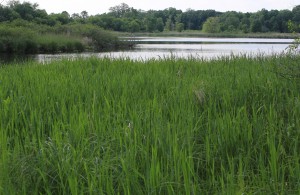
Marie Coppa’s easement, protecting important wetlands in Livingston County.
One recent project protected 42 acres in Livingston County’s Unadilla Township containing wetlands, a remnant oak savannah, and more than 1,500 feet of Portage Creek frontage. The property, owned by Marie Coppa, is home to two threatened species of turtle, and is adjacent to the Unadilla Game Area, thus providing additional permanent wildlife habitat.
Another project in the same watershed is comprised of 26 acres in Livingston County’s Putnam Township that contain one-half mile of Portage Creek frontage. The protected property is owned by Bob Nester, who learned about land protection as a neighbor of Legacy’s Reichert Preserve, bequeathed to Legacy by the late Dr. Rudolph Reichert in 2013.
“The Reichert Preserve,” noted Susan Lackey, Legacy’s Executive Director, “serves as an anchor for land protection initiatives in that part of our service area. It allows us to envision a connected string of protected lands that, taken together, can help safeguard water quality throughout that region of the watershed.
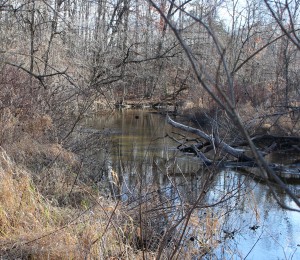
Portage Creek frontage is protected as part of Bob Nester’s easement.
“My neighbors commented to me that the entire dynamic of the community would have changed dramatically if I hadn’t pursued the opportunity to protect this stretch of water,” said landowner Nester.
“It’s rewarding,” Nester added, “to know that this creek frontage, now that it’s protected, is pretty much the way it will remain in perpetuity.”
A growing network of lands protected by Legacy and other partners further signals the importance of protecting small streams that feed into the Huron River. Thirty acres in Lodi Township at the headwaters of Honey Creek were recently protected with Legacy by owners Karen and David Ufer, who recognize the importance of groundwater recharge as it affects a community’s water quality.
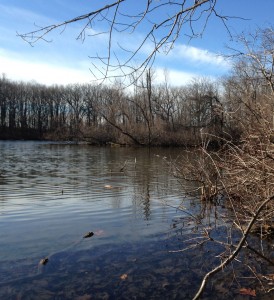
Karen and David Ufer’s easement will protect the water quality of Honey Creek’s headwaters.
Working in partnership with the Washtenaw County Parks and Recreation Commission (WCPARC), Legacy Land Protection staff members provide technical assistance with conservation projects that can take many months to finalize. Recently two such local privately owned farmland conservation projects were successfully closed.
Dale and Julie Frey, representing a longtime farming family, chose to protect 115 acres in Lima Township. The resulting easement, held by WCPARC, was funded by the federal farm program and WCPARC.
A second WCPARC project, finalized with siblings Robert and Margaret Rockol in Northfield Township, adds an additional 167 acres of protected farmland in the region, and also involved federal funding. The Rockols now know the farm they grew up on will remain farmland forever.
“Our father was born on the place,” Margaret Rockol said. Her brother, Robert Rockol, added, “We worked so hard, as a family, to produce agricultural products on this land.”
Margaret noted that neighbors often stop by the farm to comment on how much they like to observe what’s happening on the land from season to season. Now that the land is protected, Robert said, “I like to picture the next people who take care of this land growing crops on it, too.”
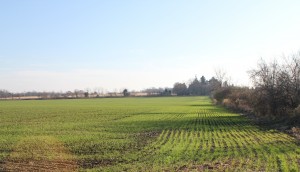
Dale and Julie Frey’s easement protects 113 acres of farmland in Lima Township.
Throughout the region, landowners have worked with Legacy Land Conservancy—Michigan’s oldest local land trust—to protect land that is important to the community because of its scenic or recreational value or in order to conserve working farms and natural areas and safeguard watersheds. Legacy cites a bipartisan congressional action finalized in late 2015, which made permanent a federal tax incentive supporting land conservation, as a further boon for future protection efforts.
Farmers, ranchers and the public directly benefit from the incentive, which encourages landowners to place a conservation easement on their land to protect important natural, scenic and historic resources.
“Making these tax incentives permanent was not only a huge win for encouraging much-needed permanent land conservation in our rapidly growing region, it’s a huge win for individuals and families struggling to balance very real financial constraints with their desire to protect their land for future generations,” said Lackey. Lackey went on to say that “this important legislation opened the door to land owners who might not previously have been able to consider signing a conservation easement.”
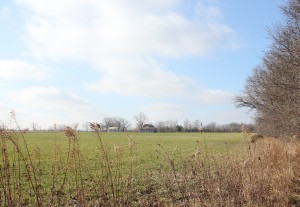
The Rockol’s easement will ensure that their farm is protected, forever.
The incentive grants certain tax benefits to landowners who sign a conservation easement. Such private, voluntary agreements with local land trusts permanently limit uses of the land in order to protect its conservation values. Lands placed into conservation easements remain privately owned and can continue to be farmed, hunted or used for other specified purposes. The lands also remain on county tax rolls, strengthening local economies.
Legacy’s land protection specialists welcome inquiries from landowners considering a protection strategy for their property.
“I’m happy enough with the process,” affirmed landowner Nester, “that I’m now working with Legacy on protecting a larger piece of property, to accomplish conservation aims on a greater scale.”
“Everyone at Legacy was wonderful to work with,” said Margaret Rockol. “We had a lot of fun, and it was so easy,” she added.

 RSS Feed
RSS Feed